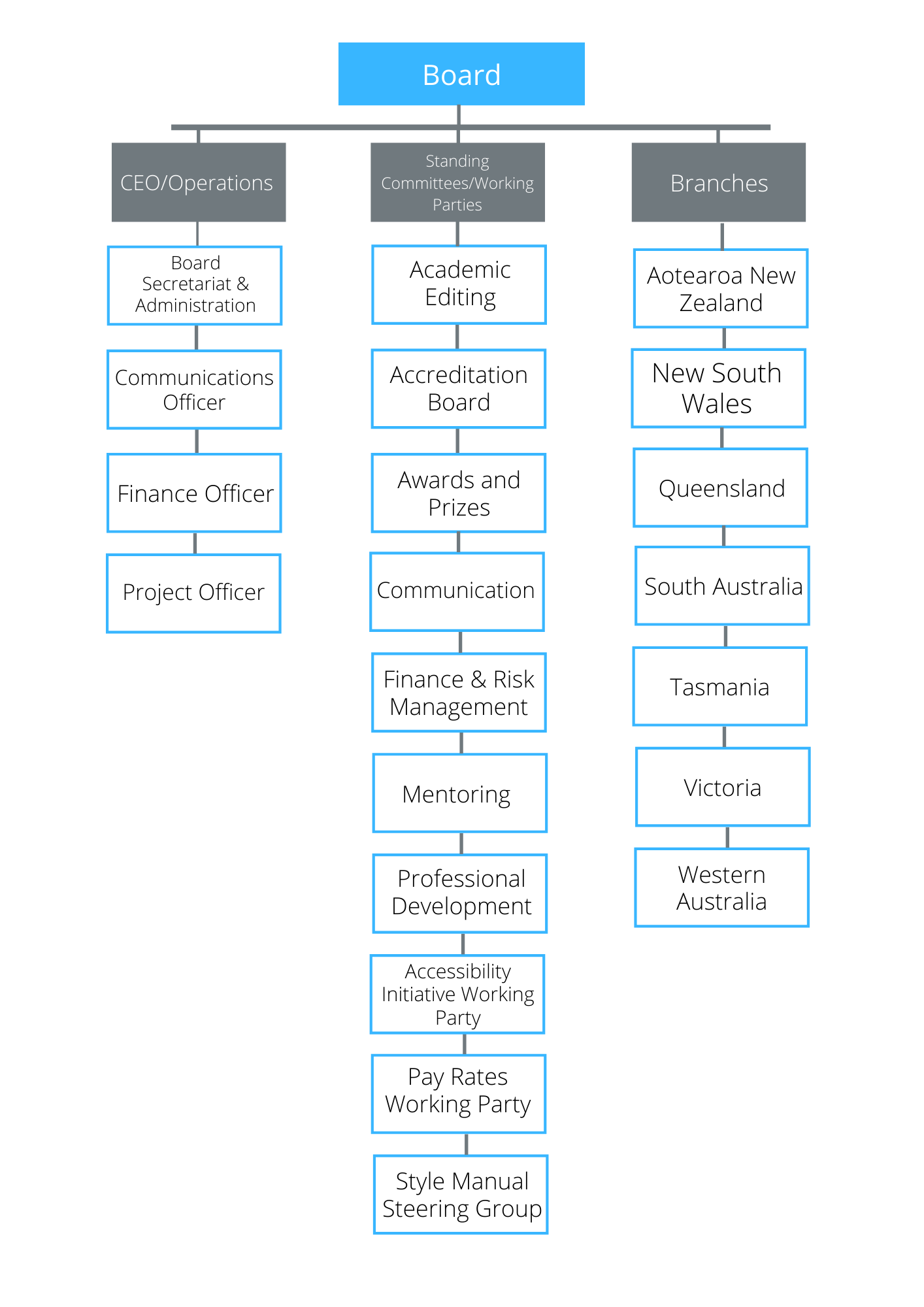IPEd is governed by a board comprising one Director from each branch and another three appointed by the Board.
IPEd Board
IPEd is governed by its Directors who act together as the Board, which comprises 10 Directors. Each Branch appoints one Director, and the Board appoints the others, usually to bring in particular skills. Directors appointed by Branches serve two-year terms. Directors appointed by the Board serve terms of up to two years as determined by the Board. Retiring Directors are eligible for reappointment.
Present board directors are:
- Stephanie Holt AE, Chair and Editors Victoria
- Ruth Davies AE, Immediate past Chair and Editors Queensland
- Vacant, Editors Tasmania
- Melanie Dankel AE, Editors South Australia
- Catherine Macdonald AE, Editors Western Australia
- Justine Dixon, Editors New South Wales
- Russell Noakes, Company Secretary
- Hana Krskova, Finance Director
- Vanaja Thomas, Membership Director

Annual Reports
The Institute of Professional Editors Limited produces an annual report at the end of each financial year.
- Annual report 2023–24 [PDF, 5MB]
- Annual report 2022–23 [PDF, 12MB]
- Annual report 2021–22 [PDF, 1.1 MB]
- Annual report 2020–21 [PDF, 4.0MB]
- Annual report 2019−20 [PDF, 1.8MB]
- Annual report 2018–19 [PDF, 3.7MB]
- Annual report 2017–18 [PDF, 1.6MB]
- Annual report 2016–17 [PDF, 4.0MB]
- Annual report 2015–16 [PDF, 1.2MB]
- Annual report 2014–15 [PDF, 862KB]
- Annual report 2013–14 [PDF, 665KB]
- Annual report 2012–13 [PDF, 521KB]
- Annual report 2011–12 [PDF, 134KB]
- Annual report 2010–11 [PDF, 219KB]
- Annual report 2009–10 [PDF, 292KB]
- Annual report 2008–09 [PDF, 242KB]
Financial reports
Audited financial reports are available to members only through the Member Portal.

Committees
The work of IPEd is conducted by directors and members of IPEd’s standing committees and working parties.
Accessibility Initiative Working Party (AIWP)
The AIWP exists to research and create editorial standards, information resources and training on publishing practices that address the needs of readers with a print disability.
Accreditation Board (AB)
The Accreditation Board is responsible for administering IPEd’s accreditation scheme, including the accreditation exam. Contact the Accreditation Board chair here.
Communication and Style Standing Committee (CSCC)
CSSC oversees IPEd’s communications, assisting the Communications Officer to deliver on IPEd’s communications strategic initiatives.
Finance and Risk Management Committee (FRM)
The Finance and Risk Management Committee consists of the Chair, the Finance Director, the Company Secretary and the Finance Officer.
Mentoring Standing Committee
IPEd’s Mentoring Standing Committee exists to provide guidance to editors by matching them with someone who has knowledge and skills in select areas of the editing profession.
Pay and Conditions Standing Committee (PCSC)
The PCSC exists to establish a range of fair pay rates for editors required to sustain a long-term, viable business, at a range of skill levels and experience.
Standing Committee on Academic Editing (SCAE)
The SCAE is made up of IPEd member volunteers from across Australia and New Zealand. They have recently revised the Guidelines for editing research theses and advocate on behalf of academic editors. Contact the committee chair at scae.chair@iped-editors.org.
Standing Committee on Australian and Aotearoa New Zealand Style (SCAANZS)
The Standing Committee on Australian and Aotearoa New Zealand Style (SCAANZS) has been working with the Federal Government’s Digital Transformation Agency (DTA) on a new version of the Style Manual.
In August 2019, DTA invited IPEd to nominate a representative to an advisory board for the revised edition, along with four others, the purpose of which was to ‘provide a final decision on contentious rules and guidance that cannot be agreed upon by the authors of the 7th edition’.
SCAANZS in September 2019 called for expressions of interest (EOIs) in the role from among AEs and DEs. Eight candidates submitted EOIs and a representative was appointed in October 2019.
A private beta version of the Style Manual had been in limited circulation for some months when, in May 2020, DTA invited IPEd to submit a quotation for an expert review of a further revised public beta version, alongside three other organisational reviewers.
It was made clear to SCAANZS that the revised edition was squarely focused on government users, particularly website authors, and the scope of the review was to be confined to the revision as a ‘minimum viable product’, with future iterations to respond to further user feedback.
SCAANZS then discussed the revision work and the nature of the review of the public beta version, which was released on 30 July.
Again SCAANZS called for EOIs from AEs and DEs among IPEd members. Six submissions were considered, a review team – Edwin Briggs AE, Vicki Snowdon AE and Ilona Wallace AE – appointed, the review conducted and the report submitted to DTA.
DTA then examined the four expert reviews in terms of (in DTA’s words):
- reviewing the page-by-page feedback for changes we can take in prior to going live
- reviewing the ‘global’ feedback for changes we can [include] in future iterations
- looking at content gaps and doing more user research around topics that were out of scope for the minimum viable product.
DTA released the revised live version on 24 September and since then SCAANZS has been considering the Style Manual’s placement as a suitable revision of the 6th edition.
Standing Committee on Awards and Prizes (SCAP)
The SCAP oversees IPEd’s awards and prizes program and is made up of volunteer IPEd members.
Standing Committee on Professional Development (SCPD)
The SCPD aims to develop and oversee a PD framework with short-term and long-term programs, and maintain a PD register of all branch PD events. The SCPD is made up of volunteer IPEd members from across Australia and New Zealand. The committee chair can be contacted at chair.scpd@iped-editors.org.
If you are an IPEd member and wish to become involved in our standing committees or working parties please email the IPEd office.
